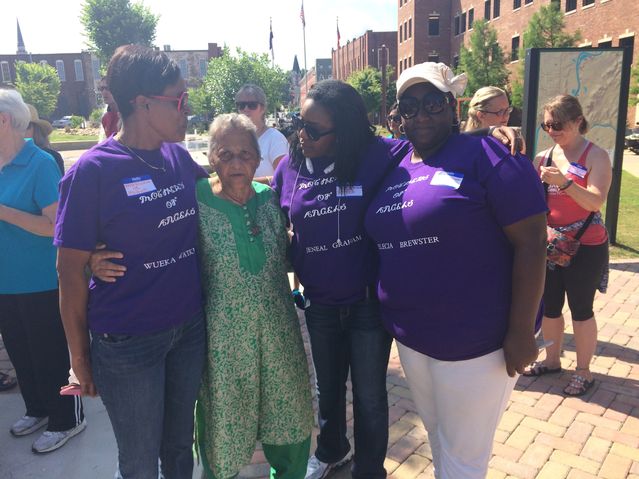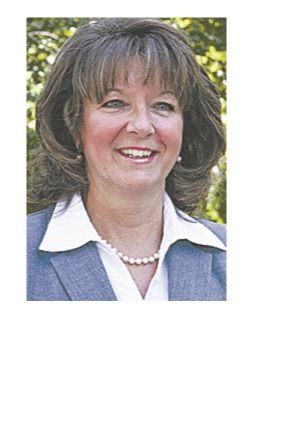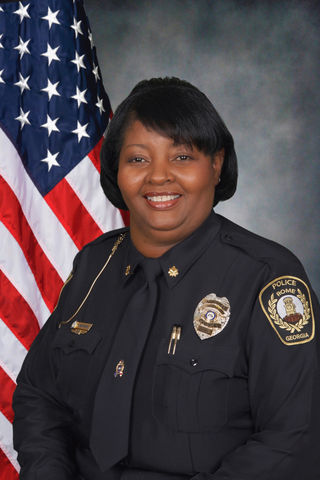Law and Crime
Rome, Georgia: The Small Town Capital of Nice
Former Mayor describes the benefits and difficulties of small town life
Posted October 5, 2016

Mothers of Angels with my mother in Rome, Georgia. The just-planted Peace Pole is in the background.
My mother lived in Rome, Georgia, about an hour north of Atlanta, for about 25 years. There are a lot of stereotypes about small towns and the South, based on historical problems. But reality doesn’t always match stereotypes. I was so struck by the friendliness of people there that I decided to ask former Rome Mayor Evie Mcneice to answer a few questions about Rome, which might be the Capital of Nice! Mcneice served as mayor from 2011-2014. I hope it’s a breath of fresh air in this season of damaging political rhetoric and regional animosity.
RC: Thank you for doing this interview! First off, maybe you can tell me a bit about yourself and your relationship with Rome, Georgia, as well as some basic information about Rome itself.

EM: Rome is located in Northwest Georgia and is the largest city in the NW corridor of the state. Our population is approximately 36,000 and the entire county of Floyd is about 96,000. Rome is a city of 3 rivers and seven hills. The Etowah River and the Oostanaula River form the Coosa River and it is at this confluence that Rome was built.
Rome is located at the center of a triangle formed by Birmingham, Alabama, Chattanooga, Tennessee, and Atlanta, Georgia. We have a city and a county government and the city has a city manager form of government with 9 city commissioners one of which is the mayor.
Rome is also the medical hub of the NW Georgia region with a privately owned hospital, a public hospital and the state's largest multi-specialty clinic - Harbin Clinic.
We also boast 4 centers of higher learning with Berry College, Shorter University, Georgia Highlands College, and Georgia Northwestern Technical College.
RC: I was so struck by the friendliness of people in Rome when I visited last summer. Pedestrians wave, smile and greet each other. Drivers in passing cars waved as they passed us. Drivers and pedestrians waved at each other. You stop for gas, and you end up in a totally pleasant conversation with the person behind the counter. Now, don’t get me wrong, I love San Francisco, my hometown, but man, you folks sure do know how to make a guy feel welcome. By the end of my week there, I thought Rome should have a new slogan: “Rome, The Capital of Nice.” Where does this niceness come from? Has it always been this way to your recollection, or did I just catch Rome on a good-hair day?
EM: I like to think Rome is like a big family. When we go to the grocery store, the gas station, the library, etc. we are genuinely happy to see people we know. Conversations and plans are made as we carry on the everyday business of life. As a smaller city we interact with people as we work, play, and live in Rome. We ask about children, grandkids, and mamas and daddies! We love for new folks to visit Rome and I hope they find everyone helpful and engaging. I love talking with new people, getting to know them, and having them get to know Rome. I truly feel we are a genteel society known better as Southern Hospitality with a cold glass of sweet iced tea!!
RC: From what I learned in my short time last year, and the times I’ve visited my mom there in the last couple of decades, there has been a lot of economic change there, and possibly also demographic. I noticed closed factories, and the sprawling Northwest Georgia Regional Hospital where my mother worked serving children and adults with disabilities and mental health issues for so long was closed down. For an audience likely unfamiliar with small towns, perhaps you could give a nutshell about population changes and economic changes.
EM: We have had several manufacturers close in the past 10-20 years and of course the Northwest Georgia Regional Hospital, which was a state ordered closing much to the chagrin of Romans. I was on the committee fighting the closure, and when Romans are passionate about an issue we band together. We had 28 meetings in 6 weeks with various local, state, and national leaders to discuss the impact the closing would have on community.
But Rome did not sit back and cry "Woe is me". We continued to prospect for industry as the City, the County, and the Chamber of Commerce worked together in a collaborative effort to keep Rome moving forward. Our biggest accomplishment was a 4 year effort to land Lowes Distribution Center which provides 800-900 new jobs to our area. We have Marriott that came in and is building a city redevelopment designed hotel on our waterfront. We have companies such as Pirelli, Suzuki, F & P of Georgia, Neaton Rome - international companies who had made the decision to make Rome their home. Quality of life is important to Romans, and besides the rivers and the sports activities associated with them, we have miles of trails, a town green with a fountain feature connecting to our River Walk (this is where your mom and I chose to have the Peace Pole she donated to the city placed and where you spoke). We have a minor league Atlanta Braves stadium which is wildly popular, we host many tennis tournaments and last Friday we opened the largest hard court tennis center in the nation!!
Rome continues to push forward with a successful vision.
RC: You’re got a beautiful downtown, where my mom and you and the current Mayor helped plant Rome’s first Peace Pole. That was quite an experience for us last year. We read poetry, held hands, and there was an interracial peace march afterwards. I was inspired by the young people and pastor who spoke so well about healing and community. I’ve been to many rallies and marches in San Francisco, which also inspired with their diversity. So it’s interesting that we all share some common rituals, a nod to the importance of relationship and community.
But I also know there are forces adversarial to those values. I heard recently there was a White Supremacist group trying to move into Rome. Perhaps you could fill me in on the salient details, and the community’s response.
EM: Our community was very surprised to see two groups come and want to march in our streets with their radical beliefs. We spoke with the Chief of Police and even though we had to allow the march, the citizens of Rome and Floyd County stepped up in an amazing way. T-shirts were made that said "Turn your back on hate" and when the marchers came down the street there was no heckling, no acknowledgment, no conflicts. The people simply turned their backs to the marchers. We felt the marchers wanted recognition and chaos and our folks would have none of that. Many community groups have sprung up after the white supremacist group and the Malcolm X group came to town, condoning only love, peace, hugs, and community cooperation. Our churches have realized that Sundays are the most divided times between races and the church leaders are now working together so parishioners can worship together and feel a sense of camaraderie.
RC: At our peace rally, I also hugged and spoke with several mothers whose children had died from gun violence, the “Mothers of Angels”. What are the stats on gun violence, and what is being done to address gun violence in the city? What are the obstacles?

(Assistant Chief of Police Debbie Burnett provided the following on behalf of Chief of Police Denise Downer-McKinney)
2015
Homicide: 3
Robbery: 14
Assaults: 59
2016
Homicide: 2
Robbery: 18
Assaults: 21
These are not all necessarily founded crimes. These are incidents reported involving a gun. What that means is that not all of the reported crimes actually occurred, but we as an agency always document a reported crime.
As far as officer-involved shootings our data is good. The last officer involved shooting where the suspect was killed was 2004. This case involved a burglary in progress where the suspect grabbed one of the officers with the 2nd officer firing her weapon striking the suspect. We had one firearms discharge between an officer and suspect in 2015 where neither the officer or the suspect were struck.
Each year we teach de-escalation techniques during our required response to resistance training. We also train annually on bias based profiling. We send our officers to Crisis Intervention Training which teaches them how to deal with mentally ill persons. The majority of our department has completed this training.
RC: I know Asheville, NC has become a hub for cultural activities and food. I thought that Rome is the perfect place for an Artist’s Colony, or other incentives to bring in artists to help revitalize and move the city forward. The arts are a powerful way to express, feel and heal.
EM: I love the question about Asheville and an artist community! We have many talented artists in Rome from music, painting, sculpting, writing, and dancing. I serve on the Downtown Development Authority and we had a study commissioned regarding our 5th Avenue corridor to explore the highest and best use of that area which borders on our Broad Street. The study concluded that this area would be an excellent spot for an Artist's colony! There are many little cottages dotting the landscape and a bridge crossing one of our rivers. A couple of antique shops have been opened and the excitement has been building about this area. We have engaged in more public art around the community and I am chairman of a committee that is working on our crosswalks on our main downtown area, Broad Street. We have artwork that will be painted across the crosswalks depicting feet on the streets, such as a hopscotch template, feet in dance steps to dance as you cross, and several other ideas. We also have the oldest symphony in the south which produces wonderful concerts. We have music festivals, artist fairs (Chiaha), downtown street art sales, wine festivals, street parties with bands on different block, murals and so much more. I am a staunch advocate for the arts and was honored to be given the R.A.C.A. award, Rome Area Champion for the Arts, by our own Rome Area Council for the Arts. I believe the arts make a city seem alive and vibrant. Everyone can relate to the arts as a quality of life issue and it brings visitors to our city from near and far. The Chamber of Commerce does an intercity leadership visit each year to a community similar to Rome or to one Rome would like to emulate. We are able to see how they have become the city they are so we can learn from them. We also ask "What would you have done differently?" This past year we went to Asheville, Greenville, and Hendersonville and studied their arts, technology, and quality of life issues. We brought back some great ideas!
RC: This election year seems very polarizing, and I’m concerned that once civility gets thrown out the window, we end up in a primitive dungeon of our discontents instead of the lofty ideals of hope and inclusion. As a psychiatrist, I worry that inflammatory rhetoric will leave people with grudges, anger, dissatisfactions and discontents. (Like now, but worse LOL) I was so impressed with you and current Mayor Jamie Doss. “Better than a thousand hollow words, is one word that brings peace.” You both brought peace, as did all the other idealistic youth gathered. Instead of fracture, we could muster the strength in relatedness to bring us together more completely. As humans, we all search for wholeness in some way. What does Rome need to be whole?
EM: As wonderful as I know Rome is, Rome is not completely whole. We have our share of problems, crime, economic woes, division rather than inclusion and cooperation. Some days it seems we are all on a different page but then I see the strength and determination of our citizens to right the wrongs we see. Our people step up and step out even in the face of fear or rejection. We know that, as a former city commissioner once stated, "Working together works". We can effectuate change as long as we see that we are all more alike than different. We have the same needs and wants for the place we call home. Our beloved Rome.
RC: Thank you, Evie! I hope all communities, large and small, can learn from the Rome experience. "Nice" equals kindness which leads to compassion and community, so I hope we can all get on board!
(c) 2016, Ravi Chandra, M.D. F.A.P.A.
Occasional Newsletter to find out about my book-in-progress on the psychology of social networks through a Buddhist lens, Facebuddha: Transcendence in the Age of Social Networks: www.RaviChandraMD.com
Private Practice: www.sfpsychiatry.com
Twitter: @going2peace
Facebook: Sangha Francisco-The Pacific Heart
For info on books and books in progress, see here and www.RaviChandraMD.com




